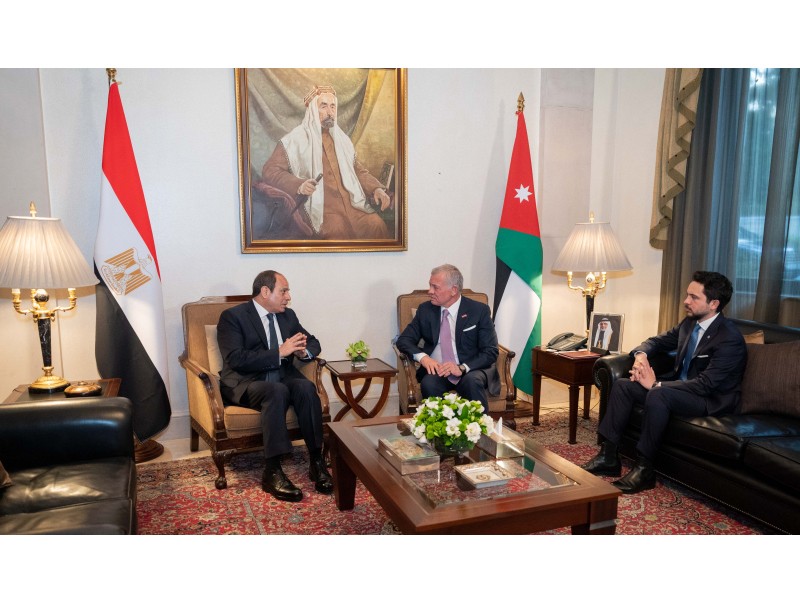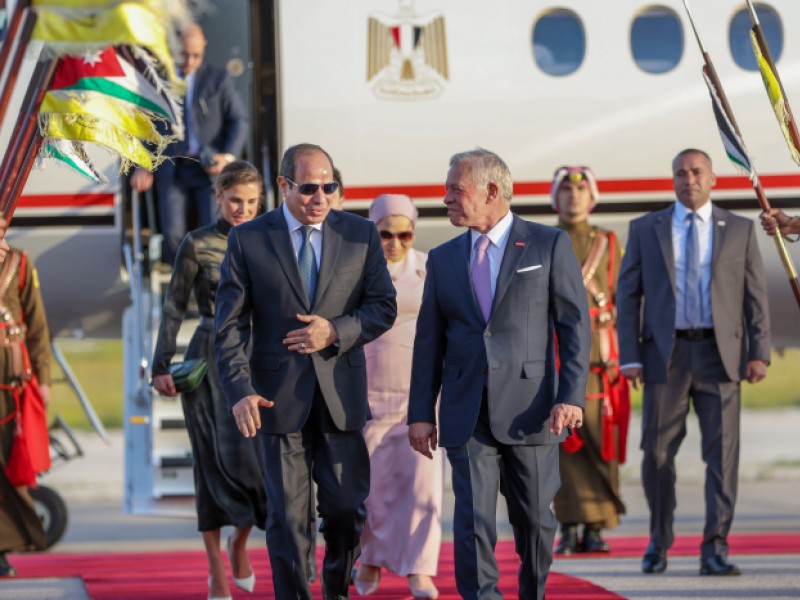Queen Rania visits South Africa to promote safety
(Office of Her Majesty, Press Department – South Africa) At the opening session of the World Health Organization's 8th World Conference on Injury Prevention and Safety Promotion in Durban, South Africa, Her Majesty Queen Rania Al Abdullah urged global leaders, physicians and citizens of the world, on Sunday, to "elevate humanity's primal instinct to shield loved ones into a global instinct to shelter and safeguard one another."
"For most of us, in our daily lives, promoting safety is as natural as breathing," she said, "yet somewhere, somehow along the lines, we stop looking after humanity."
She reminded her audience of the importance of providing peace and safety to everyone around the world and alluded to the dangers of complacency. "In an era of global interconnections, we are reckless not to care [because] in today's increasingly interdependent world, violence anywhere hurts everywhere."
Her Majesty said that while it is essential to bring experts together to discuss ways of preventing injury and promoting safety, more action is needed. It is time to "move from data to action as far as safety is concerned," she said.
The World Conference is a bi-annual conference, which gives the opportunity to share up-to-date information on the prevention of violence and injuries that occur on the road, at home, at school or in the workplace. Related topics covered by the conference include trauma management, disaster control, and child safety. The theme for the conference, which began April 2 and will go on until April 5, is Data to Action, emphasizing the scientific approach to prevention.
After the opening session of the conference, Her Majesty returned to Cape Town. On Monday, Queen Rania, a member of the UNICEF Global Leadership Initiative for Children, visited the Vukile Tshwete Enrichment Center and the Tygerberg Hospital, where she learned of the incredible advancements in education and medicine in those facilities.
Dozens of excited children joined Pierre Uys, Western Cape Minister of Health; Freda Brock, Director of the ELRU; and Beryl Hermanus, Operating Manager of the ELRU in welcoming the Queen.
After receiving a briefing on the ELRU and the enrichment center and meeting with several of the social workers at the center, Her Majesty toured the facility's various rooms—including the early child activity room, the playroom, the toy library. Parents and children said they were thrilled to have Queen Rania visit.
The Vukile Tshwete Enrichment Center is run by the Early Learning Resource Unit, a non-governmental organization administered by the Cape Educational Trust. The organization was established in 1978 to offer alternative learning programs for young children. It currently accommodates 78 children between 2 1/2 to 6 years of age. The center's outreach program involves community fieldworkers visiting homes within the same community, generally homes where young children are not enrolled in formal or non-formal schools because of the limited financial resources of their parents or caregivers.
Queen Rania commented on the importance of such centers everywhere, saying "I wish all children could have access to such a tremendous educational resource and such dedicated, inspirational teachers. The center’s determined efforts to reach out to all children in the community and utilize innovative methodologies in doing so, makes it a model of good practice – one which I hope can be replicated elsewhere." Her Majesty is a strong advocate of early childhood development programs and has begun several educational initiatives targeting women, youth and children in Jordan.
Following her visit to the center, Queen Rania went on to visit the Tygerberg Hospital where she was received by Dr. Terence Carter, CEO of the Tygerberg Hospital; Gerhard Theron, the Acting Head of the Obstetric and Gynecology Unit; and Rachel Basson, Head of Nursing.
Dr. Carter briefed Her Majesty on the various wards at the hospital, its excellence in providing peri-natal and postnatal health services, and its health care for sick, high risk, low birth weight and HIV positive newborn babies. During the briefing, Dr. Carter spoke of the Teddy Bear Clinic for Abused Children.
An active proponent against child abuse, Queen Rania has spearheaded efforts to raise awareness on the issue of child welfare in Jordan as an integral part of the development of society. The Jordan River Foundation, which she chairs, has established a child safety program to enhance positive child-rearing practices to safeguard children, and to identify, confront, and eliminate various types of abuse through increased awareness, prevention, and rehabilitation
Dr. Carter and Pierre Uys accompanied Her Majesty on a tour of the hospital units where she interacted with doctors, nurses, and patients and learned more about the various facilities and high-care services provided to mothers and new borns.
At the maternity care unit, Queen Rania, a mother of four herself, congradulated new mothers on their new borns and commended the commitment of doctors and nurses, noting that, often, “a short intervention at the right time can make all the difference.”
Her Majesty observed methods of the Kangaroo Mother Care Unit where premature and low birth weight babies are taken care of. Her Majesty said she was delighted to see how progressive technology and practices were ensuring the safety and enhancing the well-being of both mothers and children at this crucial stage of their lives.
The Kangaroo Unit provides care for sick, high risk, lowbirth weight and HIV positive newborn babies. It has excellent linkages to prevention of mother to child transmission (PMTCT) services and offers universal counseling. It also offers anti-retroviral (ART) treatment.
Low birth weight infants who must stay in hospitals for nursing care are usually separated from their mothers and formula-fed. They are usually kept in incubators to maintain their body warmth. By comparison, Kangaroo Care involves almost constant skin-to-skin contact between mother and infant, which is as effective as incubator care for warming infants once life-support is no longer necessary.
According to the Tygerberg Hospital, low-birth weight babies will be able to return home much sooner if their mothers practice Kangaroo Care.
The Tygerberg Hospital was inaugurated in 1976 and is the largest hospital in the Western Cape Province and the second largest hospital in South Africa. It is an academic hospital and center of excellence training institution for medical students, nurses and paramedical staff dealing with patients from all racial and income backgrounds. It serves roughly 2 million patients a year and has attained UNICEF "Baby Friendly" status.
مواضيع مختارة
موقع جلالة الملكة رانيا العبدالله الرسمي
هذا الموقع الإلكتروني لا يدعم متصفحات الإنترنت القديمة. الرجاء تحديث متصفح الإنترنت إلى نسخة أحدث من إنترنت إكسبلورر 9
متصفح الإنترنت الذي تستخدمه قديم. لتحسين مستوى الأمان عند تصفح مواقع الإنترنت و مشاهدتها بالشكل الصحيح و بفعالية افضل قم بتحديث متصفح الإنترنت الخاص بك



